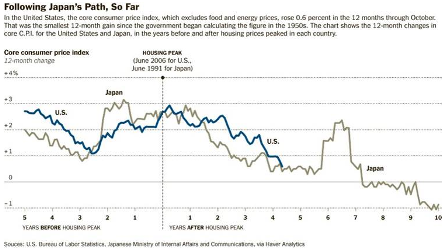China is traditionally a first half/second half story, with h2 notably slower than h1 as fiscal and lending initiatives have generally been front loaded.
So watch for a very weak h2:
May 26 (Bloomberg) — China’s stocks slid for a sixth day, driving the benchmark index to the longest stretch of losses in 11 months, on concern tightening measures are slowing the economy and making it harder for small companies to borrow money.
Huaxin Cement Co., an affiliate of Holcim Ltd., dropped 2.9 percent after Shanghai Securities News reported China’s industrial output may slow. A gauge of small-capitalization stocks fell to the lowest close in four months as Citigroup Inc. said smaller companies are being squeezed by tighter credit. Kangmei Pharmaceutical Co. led declines for drugmakers on speculation the government will further lower drug prices.
“Sentiment is weak and we haven’t seen anything positive that can support stocks,” said Dai Ming, fund manager at Shanghai Kingsun Investment Management & Consulting Co. “Slowing growth, high inflation and tight lending will continue to weigh on the market in the near future.”
The Shanghai Composite Index, which tracks the bigger of China’s stock exchanges, fell 5.23 points, or 0.2 percent, to 2,736.53 at the 3 p.m. close, erasing a gain in the last half hour of trading. The six-day decline is the longest since July 1. The CSI 300 Index lost 0.4 percent to 2,978.38, while the CSI Smallcap 500 Index retreated 1 percent.
The Shanghai gauge has slumped 2.5 percent this year as the central bank raised the reserve-requirement ratio for banks 11 times and boosted interest rates four times since the start of 2010 to cool inflation, which exceeded the government target each month this year. China’s preliminary manufacturing index
fell to its lowest level in 10 months, according to a report from HSBC Holdings Plc and Markit Economics this week.
Huaxin Cement slid 2.9 percent to 22.19 yuan. Offshore Oil Engineering Co. lost 4.9 percent to 6.42 yuan, the lowest close since Aug. 27. SAIC Motor Corp., China’s largest carmaker, fell 1.4 percent to 15.96 yuan.
Slowing Industrial Output
China’s industrial output growth is expected to slow in coming months as companies continue to destock and power shortages restrain production, Xu Ce, a researcher with the State Information Center, wrote in a commentary published in Shanghai Securities News. Government efforts to cut capacity in some industries will also restrain output growth, Xu wrote.
Sanan Optoelectronics Co., China’s biggest producer of light-emitting diode chips, led declines for smaller companies, slumping 3.7 percent to 16.71 yuan. Haining China Leather Market Co. plunged 5.6 percent to 21.53 yuan.
China’s small- and medium-sized companies are being squeezed by credit rationing and rising costs, Minggao Shen, an analyst at Citigroup, said in a report after meeting clients.
Bank Funding
The seven-day repurchase rate, which measures funding availability between banks, has averaged 3.48 percent so far this month, compared with 2.83 percent in April and 2.39 percent in March. The seven-day repo rate was at 5.08 percent as of 11:31 a.m. in Shanghai, according to a weighted average compiled by the National Interbank Funding Center. It touched 5.50 percent yesterday, the highest level since Feb. 23.
Kangmei fell 8.5 percent to 11.90 yuan, the biggest decline in almost 21 months. Nanjing Pharmaceutical Co. slid 6.9 percent to 12.44 yuan. Northeast Pharmaceutical Group Co. lost 6.3 percent to 16.37 yuan.
“Institutions are selling drugmaker shares because there’s still a lot of uncertainty about the next round of drug price cuts by the government,” said Li Ying, analyst at Capital Securities Corp.
Chinese stocks are “getting close to the market bottom” after recent declines and may gain as much as 20 percent this year, according to Steven Sun, Hong Kong-based head of China equity strategy at HSBC Holdings Plc.
The nation’s equities may rally in the second half of 2011, as easing inflation from June onward allows the central bank to hold off on its policy tightening campaign, Sun said in an interview with Bloomberg Television yesterday.
“We are getting close to the market bottom,” he said. “We are talking about a 15 to 20 percent upside by the end of this year.”
China Steel Reduces Prices as Industrial Output Slows
May 25 (Bloomberg) — China Steel Corp., Taiwan’s largest producer, will cut prices for domestic customers after the island’s industrial output slowed.
Prices will fall by an average 4.2 percent for July and August contracts, the Kaohsiung-based company said in an e-mailed statement today. Hot-rolled coil, a benchmark product, will fall by an average NT$1,754 ($61) a metric ton, while cold- rolled steel will be cut by an average NT$1,419 a ton.
Steel demand may decline after industrial production increased at the slowest pace in 19 months in April. Vehicle and auto part output fell 0.35 percent last month from a year earlier, the Ministry of Economic Affairs said May 23.
China Steel dropped 0.4 percent to close at NT$34.25 in Taipei before the announcement. The stock has climbed 2.2 percent this year, compared with the 2 percent decline in the benchmark Taiex index.
Electro-galvanized sheet prices will be cut by NT$1,500 a ton, electrical sheets by NT$2,600, and hot-dipped zinc-galvanized sheets by NT$1,613, China Steel said. Prices of plates, bars and wire rods will be left unchanged, the steelmaker said, without giving specific percentage changes for the products.


